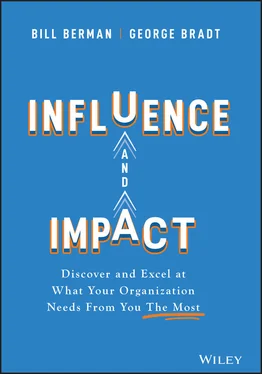After about the 125th person came in and asked me how to rewind the film, or which button to push for zoom, my frustration began to boil over: “If you bothered to read the manual, you would know that the zoom button is right here,” I said, clearly disgusted. The owner saw this and took me aside. “Bill, you came here to sell cameras, but that is not why you are here. You are here to sell film and film developing, because that is what keeps the store running. I need you to talk nice to the customers, answer their questions, no matter how simple, and provide good customer support. If you do that, more people will buy film or get their pictures developed here. That's how we make money. If you treat them poorly, they will go somewhere else. Your job is to get them to come back for those purchases. So, go, be nice, and solve their very simple problems for them.”
At first, I was demoralized. I was going to spend the sweltering D.C. summer being bored. Ironically, I was already frustrated and disappointed because, at age 15, I was not aware of the underlying value of my job. My real job was to make customers feel taken care of. After this lecture from my boss, people's simplistic questions stopped being annoying, because I understood what my boss and the customers needed from me the most, and adapted to that .
So, what is the disconnect between you and what your organization needs from you most? What causes you to feel stuck, or stalled, that you aren't having the impact you want? How can you bring more value to your company and meaning for yourself? In many situations, you are making one or two simple but consequential mistakes: You are not focused on the mission-critical parts of your responsibilities, or you are not doing them in the way that the organization can understand and embrace.
“Wait, what?” you think. “I have objectives. I review these with my manager. How could I be doing the wrong things?” You may be doing the right things at one level, but when you dig a little deeper, you may find you are off the mark—though your boss might also be unaware, because they are focused on doing what they have always done rather than adapting to the current reality of what the organization needs. Or, you may be communicating or interacting in the way that the organizational culture cannot understand or appreciate. iii
What we have found, again and again, is that people tend to underperform because they do what is comfortable, what is familiar, or what they desire, rather than what is most important to the organization. The majority of people we have coached believed they were doing the right things, but they did not understand the organization's top priorities. A smaller proportion knew that they weren't doing the right work but were unable to change their mindset so that they could do the work right.
Regardless of whether their choices were conscious or unconscious, they all found themselves stalled, frustrated, and under-recognized and under-appreciated by their manager or their company. Is any of this true for you?
One of the most common causes of losing influence and impact is when you find yourself doing your direct reports’ jobs instead of your own. You feel pressured and stressed and find it more comfortable to do work yourself than to give it to someone who works for you. There are a number of reasons, all of them valid to some degree:
“It's faster for me to do it.”
“I don't want to overburden my people. I'll take it on.”
“They aren't skilled, and I don't have the time to teach or coach them.”
“It has to be done just right, and I don't have people who can do it as well as I can.”
Each one of these feels right and may be true in the short run. But at some point, your people start to feel that they aren't growing, and feel their value is eroding just as yours is.
Tommy was known for having a blend of technological, operational, and business expertise that helped him rise to become the leader of a 1500-person business unit spanning four continents. He knew the economics of his business and was able convert his skills into practical technology and process solutions. But like many people, his strengths were also his weaknesses. Because Tommy understood the business in such depth, he often knew the answers well before his team did. As a result, he would identify the solution, inform others, and tell them to execute. He spent a lot of time evaluating their work, making adjustments, and providing direction. Unsurprisingly, his team resented what felt to them like micromanaging. Tommy felt overworked and underappreciated. His team felt undervalued, under-challenged, and demoralized .
His boss asked one of us ( Bill) to work with Tommy—to help him focus on what she needed most from Tommy: Enterprise strategy, reorganization, offshoring, and cross-business collaboration .
As we worked together, Tommy acknowledged that his impatience to get to a solution often made him annoyed at his team members, and he expressed frustration when he found himself sitting in a meeting, knowing the answer, and not hearing anyone tell him the solution .
I asked, “Why do you need to sit in those meetings? What would happen if you asked them to come up with solutions and present them to you?”
Tommy quickly began to realize that he was avoiding the more complex and long-term aspects of his work where he had less confidence.
His core job was to build collaborative relationships with senior leaders of lines of business, manage groups whose objectives and rewards were in conflict with his, and deal with complex problems that had no obvious solution.
Tommy stepped back and let his team sort out the operational problems. He discovered that, without his involvement, they often came up with reasonable solutions. And when they did not initially find a reasonable answer, he started redirecting them and letting them go back to work the problem more .
Tommy's boss eventually noticed that he had freed up time, and told him, “I've been waiting for you to figure this out.” As Tommy confronted his self-doubts, he was able to focus more on the high-level relationships and the complex challenges that really deserved his attention .
Sometimes it is faster to do it yourself. Or, you may just fall back on what you find to be rewarding or gratifying. Think of this like “mowing the lawn,” or “doing the dishes,” because the tasks are simple, well-defined, and have a beginning and an end. They rarely require the level of skill the individual brings to the table, but it is much easier (to continue the analogy) to wash the dishes than to figure out how to redesign the kitchen to include a dishwasher.
Just because you are better at some things than your people are doesn't mean you should do them. Your technical expertise is important. But that is not what you are paid for, and when you dive into a problem that calls for your technical expertise you lose hours of the most precious commodity of all—time. And your people learn nothing. Because you did the work yourself, your organization is no better equipped to do the work next time. You unintentionally teach your people to do sloppy jobs, since they know you will overrule or fix their work. They stop bringing their A game .
Doing the Job You Wish You Had
One of the quickest paths to losing influence and impact comes from trying to do jobs that belong to your colleagues. Many clients have told us, “My colleagues aren't getting their work done! And when they do, it's inadequate. That prevents me and my team from being successful. They should let me take that on.” These individuals rarely see themselves as self-interested. They are trying to help their manager, or the organization, succeed more quickly or operate more efficiently. They are trying to have more impact.
Читать дальше












